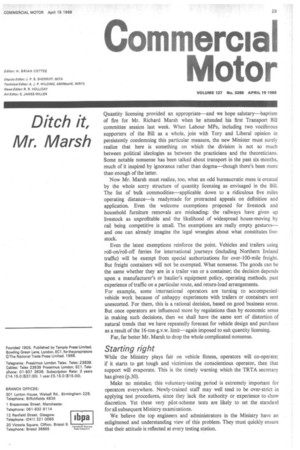Commercial Motor
Page 31

If you've noticed an error in this article please click here to report it so we can fix it.
Quantity licensing provided an appropriate—and we hope salutary—baptism of fire for Mr. Richard Marsh when he attended his first Transport Bill committee session last week. When Labour MPs, including two vociferous supporters of the Bill as a whole, join with Tory and Liberal opinion in persistently condemning this particular measure, the new Minister must surely realize that here is something on which the division is not so much between political ideologies as between the practicians and the theoreticians. Some notable nonsense has been talked about transport in the past six months, much of it inspired by ignorance rather than dogma—though there's been more than enough of the latter.
Now Mr. Marsh must realize, too, what an odd bureaucratic mess is created by the whole sorry structure of quantity licensing as envisaged in the Bill. The list of bulk commodities—applicable down to a ridiculous five miles operating distance—is readymade for protracted appeals on definition and application. Even the welcome exemptions proposed for livestock and household furniture removals are misleading: the railways have given up livestock as unprofitable and the likelihood of widespread house-moving by rail being competitive is small. The exemptions are really empty gestures— and one can already imagine the legal wrangles about what constitutes livestock.
Even the latest exemptions reinforce the point. Vehicles and trailers using roll-on/roll-off ferries for international journeys (including Northern Ireland traffic) will be exempt from special authorizations for over-100-mile freight. But freight containers will not be exempted. What nonsense. The goods can be the same whether they are in a trailer van or a container; the decision depends upon a manufacturer's or haulier's equipment policy, operating methods, past experience of traffic on a particular route, and return-load arrangements.
For example, some international operators are turning to accompaniedvehicle work because of unhappy experiences with trailers or containers sent unescorted. For them, this is a rational decision, based on good business sense. But once operators are influenced more by regulations than by economic sense in making such decisions, then we shall have the same sort of distortion of natural trends that we have repeatedly forecast for vehicle design and purchase as a result of the 16-ton-g.v.w. limit—again imposed to suit quantity licensing.
Far, far better Mr. Marsh to drop the whole complicated nonsense.
Starting right
While the Ministry plays fair on vehicle fitness, operators will co-operate; if it starts to get tough and victimizes the conscientious operator, then that support will evaporate. This is the timely warning which the TRTA secretary has given (p.30).
Make no mistake; this voluntary-testing period is extremely important for operators everywhere. Newly-trained staff may well tend to be over-strict in applying test procedures, since they lack the authority or experience to show discretion. Yet these very pilot-scheme tests are likely to set the standard for all subsequent Ministry examinations.
We believe the top engineers and administrators in the Ministry have an enlightened and understanding view of this problem. They must quickly ensure that their attitude is reflected at every testing station.








































































































































